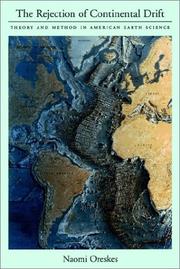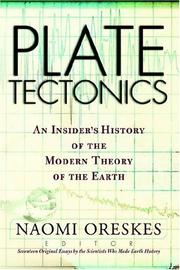| Listing 1 - 10 of 26 | << page >> |
Sort by
|
Book
ISBN: 9780691179001 069117900X Year: 2019 Volume: 3 Publisher: Princeton, N.J. Princeton University Press
Abstract | Keywords | Export | Availability | Bookmark
 Loading...
Loading...Choose an application
- Reference Manager
- EndNote
- RefWorks (Direct export to RefWorks)
"Do doctors really know what they are talking about when they tell us vaccines are safe? Should we take climate experts at their word when they warn us about the perils of global warming? Why should we trust science when our own politicians don't? In this landmark book, Naomi Oreskes offers a bold and compelling defense of science, revealing why the social character of scientific knowledge is its greatest strength--and the greatest reason we can trust it. Tracing the history and philosophy of science from the late nineteenth century to today, Oreskes explains that, contrary to popular belief, there is no single scientific method. Rather, the trustworthiness of scientific claims derives from the social process by which they are rigorously vetted. This process is not perfect -- nothing ever is when humans are involved--but she draws vital lessons from cases where scientists got it wrong. Oreskes shows how consensus is a crucial indicator of when a scientific matter has been settled, and when the knowledge produced is likely to be trustworthy."
Philosophy of science --- Science --- Social aspects --- Philosophy --- Sciences --- Social aspects. --- Philosophy. --- Aspect social. --- Philosophie. --- Philosophie des sciences. --- Science - Social aspects --- Science - Philosophy --- Science - Philosophy - Social aspects

ISBN: 0197561187 1280761547 9786610761548 0195353609 9780195353600 9780195117332 0195117328 0195117336 9780195117325 9781280761546 661076154X Year: 1999 Publisher: New York Oxford University Press
Abstract | Keywords | Export | Availability | Bookmark
 Loading...
Loading...Choose an application
- Reference Manager
- EndNote
- RefWorks (Direct export to RefWorks)
Why did American geologists reject the notion of continental drift, first posed in 1915? And why did British scientists view the theory as a pleasing confirmation? This text, based on archival resources, provides answers to these questions.
Continental drift. --- Geology --- Geognosy --- Geoscience --- Earth sciences --- Natural history --- Continental displacement --- Drift, Continental --- Drifting of continents --- Plate tectonics --- History --- Continental drift --- 551.241 --- 551.241 Tectosphere. Thickness and structure of Earth's crust layers where folding and faulting occur --- Tectosphere. Thickness and structure of Earth's crust layers where folding and faulting occur
Book
ISBN: 0226824004 9780226732381 9780226824000 022673238X Year: 2022 Publisher: Chicago: University of Chicago press,
Abstract | Keywords | Export | Availability | Bookmark
 Loading...
Loading...Choose an application
- Reference Manager
- EndNote
- RefWorks (Direct export to RefWorks)
"What difference does it make who pays for science? This is the question that animates Naomi Oreskes' Science on a Mission. Many might say "none," because it is often thought that if scientists seek to discover fundamental truths about the world, and they do so in an objective manner using well-established methods, then how could it matter who's footing the bill? By tracing the recent history of oceanography, Oreskes discloses dramatic changes in American science since the Cold War, uncovering how it changed, why it changed in these ways, and how these changes were productive of our current states of knowledge and ignorance. Much of this has to do with who pays.Toward the end of World War II and throughout the Cold War, the United States government poured unprecedented amounts of money and levels of logistical support into American science, and this influx of funding mattered profoundly. Science on a Mission brings to light how military support was both enabling and constricting. By influencing the direction of science, and who or what determines that direction, it resulted in the creation of important domains of knowledge, but also significant, lasting, and consequential domains of ignorance"--
Book
ISBN: 9780691212265 9780691179001 069117900X Year: 2021 Publisher: Princeton, New Jersey : Princeton University Press,
Abstract | Keywords | Export | Availability | Bookmark
 Loading...
Loading...Choose an application
- Reference Manager
- EndNote
- RefWorks (Direct export to RefWorks)
Are doctors right when they tell us vaccines are safe? Should we take climate experts at their word when they warn us about the perils of global warming? Why should we trust science when so many of our political leaders don't? Naomi Oreskes offers a bold and compelling defense of science, revealing why the social character of scientific knowledge is its greatest strength--and the greatest reason we can trust it. Tracing the history and philosophy of science from the late nineteenth century to today, this timely and provocative book features a new preface by Oreskes and critical responses by climate experts Ottmar Edenhofer and Martin Kowarsch, political scientist Jon Krosnick, philosopher of science Marc Lange, and science historian Susan Lindee, as well as a foreword by political theorist Stephen Macedo. --
Science --- Sciences --- Social aspects. --- Philosophy. --- Aspect social.

ISBN: 0813341329 Year: 2003 Publisher: Boulder Westview
Abstract | Keywords | Export | Availability | Bookmark
 Loading...
Loading...Choose an application
- Reference Manager
- EndNote
- RefWorks (Direct export to RefWorks)
Book
ISBN: 9780691222370 Year: 2021 Publisher: Princeton, NJ
Abstract | Keywords | Export | Availability | Bookmark
 Loading...
Loading...Choose an application
- Reference Manager
- EndNote
- RefWorks (Direct export to RefWorks)
Book
ISBN: 0262326108 9780262326100 9780262027953 026202795X 9780262526531 0262526530 9781322293981 1322293988 Year: 2014 Publisher: Cambridge, Massachusetts
Abstract | Keywords | Export | Availability | Bookmark
 Loading...
Loading...Choose an application
- Reference Manager
- EndNote
- RefWorks (Direct export to RefWorks)
Investigations of how the global Cold War shaped national scientific and technological practices in fields from biomedicine to rocket science.
Technology and state. --- Science and state. --- Security, International. --- Collective security --- International security --- International relations --- Disarmament --- International organization --- Peace --- Science --- Science policy --- State and science --- State, The --- State and technology --- Technology --- Endowment of research --- Science and state --- Government policy --- SCIENCE, TECHNOLOGY & SOCIETY/History of Science --- SCIENCE, TECHNOLOGY & SOCIETY/General --- SOCIAL SCIENCES/Political Science/Public Policy & Law
Book
Abstract | Keywords | Export | Availability | Bookmark
 Loading...
Loading...Choose an application
- Reference Manager
- EndNote
- RefWorks (Direct export to RefWorks)
Technology and state. --- Science and state. --- Security, International.
Digital
ISBN: 9780231537957 9780231169547 Year: 2014 Publisher: New York, N.Y. Columbia University Press
Abstract | Keywords | Export | Availability | Bookmark
 Loading...
Loading...Choose an application
- Reference Manager
- EndNote
- RefWorks (Direct export to RefWorks)
Book
ISBN: 9781596916104 1596916109 9781408824832 9781408824665 1408824833 Year: 2010 Publisher: New York, N.Y. Bloomsbury
Abstract | Keywords | Export | Availability | Bookmark
 Loading...
Loading...Choose an application
- Reference Manager
- EndNote
- RefWorks (Direct export to RefWorks)
The U.S. scientific community has long led the world in research on public health, environmental science, and other issues affecting the quality of life. Our scientists have produced landmark studies on the dangers of DDT, tobacco smoke, acid rain, and global warming. But at the same time, a small yet potent subset of this community leads the world in vehement denial of these dangers. In their new book, *Merchants of Doubt*, historians Naomi Oreskes and Erik Conway explain how a looseknit group of high-level scientists, with extensive political connections, ran effective campaigns to mislead the public and deny well-established scientific knowledge over four decades. In seven compelling chapters addressing tobacco, acid rain, the ozone hole, global warming, and DDT, Oreskes and Conway roll back the rug on this dark corner of the American scientific community, showing how the ideology of free market fundamentalism, aided by a too-compliant media, has skewed public understanding of some of the most pressing issues of our era.
Environmental protection. Environmental technology --- milieu --- Scientists --- Democracy and science --- Scientifiques --- Démocratie et sciences --- Professional ethics --- Déontologie --- Science news --- Moral and ethical aspects --- #SBIB:35H411 --- #SBIB:316.23H2 --- Democracy and science. --- Science and democracy --- Science --- News, Science --- Popularization of science --- Communication in science --- Journalism --- Technical writing --- Beleidscyclus: voorbereiding (inclusief planning) --- Sociologie van de wetenschappen --- Professional ethics. --- Moral and ethical aspects. --- Popularization --- Démocratie et sciences --- Déontologie --- klimaat --- climat --- Scientists - Professional ethics --- Science news - Moral and ethical aspects
| Listing 1 - 10 of 26 | << page >> |
Sort by
|

 Search
Search Feedback
Feedback About UniCat
About UniCat  Help
Help News
News